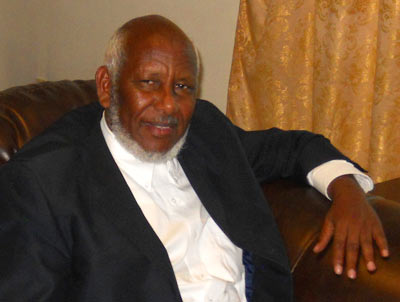Logan biologist running for presidency of famine-ravaged Somalia
October 2nd, 2011 Posted in OpinionBy Josh Ruggles
LOGAN—Aggressive famine has taken over large swaths of the country. The United Nations is warning that up to 750,000 people could die in the coming months. The nation has been engulfed in devastating civil war since 1990.
Somalia is a failed state.
And a biologist living in Logan may be the nation’s best hope.
 Ahmed Mumin Warfa is currently traveling the globe seeking support for his bid to be Somalia’s next president.
Ahmed Mumin Warfa is currently traveling the globe seeking support for his bid to be Somalia’s next president.
Born and raised in the northern African nation, Warfa was the head of the Somalia National University biology department for 20 years until rebel factions began a struggle to wrest control from the dictator Mohamed Siad Barre. Barre fled country in 1991, but militant groups are still fighting for the land today.
Although Warfa is a scientist, he was always interested in politics.
“I was dealing in politics, even when I was young,” Warfa said.
Warfa was elected the secretary general of the Somali Student Association in 1966. He later went on to be part of a small political party dealing mainly with resource management.
Because of his extensive education and outspoken attitude toward the issues in Somalia, Warfa was asked to be part of the United Nations operation in Somalia, better known as UNOSOM.
Warfa was there when the U.N. Security Council authorized its member nations to establish a secure environment throughout Somalia — a move that precipitated the ill-fated “Black Hawk Down” missions.
“I worked for the Black Hawk Down mission,” Warfa said. “I was the senior adviser for that mission.”
Warfa’s work with the United Nations led some in Somalia to mark him as a traitor and a spy. He survived several assassination attempts.
The last came in 1994 during Ramadan, the Islamic month of fasting. As he was heading home, his car was ambushed by two militia groups.
After his driver was shot, Warfa tried to run. Hearing gunshots as he tried to escape, he saw that he was bleeding.
“I thought I was OK and called the United Nations headquarters to tell them I had been attacked by the warlord gangs,” he said.
And then, he said, “I lost consciousness.”
Warfa was taken to the hospital in critical condition and had five bullets removed from his left hip. When he awoke after surgery, he had just one thing on his mind: “I want to keep fighting,” he told the family and friends that had gathered by his bedside.
Evacuated to Nairobi for safety, Warfa had spent two years in exile when militants, apparently working for Somalian warlords, attempted to kidnap him back to his home nation.
That’s when his U.N. superiors decided he wasn’t far enough from Somalia and asked him to move to the United States for his own safety.
After staying for a short time in New York, Warfa moved back to Somalia. The United Nations eventually persuaded him to move to the United States along with his family.
“I was maybe foolish enough not to understand the critical situation,” he said.
Discreetly taken to Utah, he sought a teaching position at Brigham Young University.
“They said, ‘We don’t know you but we’ve seen the bulk of your publications,’” he said. “I survived because of my publications.”
Those publications included papers detailing the discovery of about 50 species. Among these discoveries: Crotalaria warfae, a legume he discovered in a remote area of Somalia and which he named after himself.
His dark skin, religion and large beard made it difficult for Warfa to blend in at BYU.
“They asked me, ‘Where is your certificate allowing you to have this beard?’ ‘No, but I’m not Mormon,’ I said,” Warfa said about his first day on a campus well known for its observation of a strict rules of dress, demeanor and personal action. “They were unable to absorb it.”
Also working as a professor at Salt Lake Community College, Warfa has now spent nearly four decades teaching.
In August 2009, Warfa was appointed as senior adviser for Somali President Sharif Sheikh Ahmed. He resigned six months later, after concluding that Ahmed was not utilizing his advice, and is now on the campaign trail seeking international support for his own presidency in the upcoming election.
Warfa said he was initially reluctant to accept a proposal to run for president, which he says came from other prominent Somali citizens living abroad.
“I know the situation is still fluid, it is not as bad as people think,” said Warfa, who thinks he can help his homeland. “I have been to school for 27 years and I have been teaching for 37 years. If I am not an asset, who will be?”
Determined to build a strong nation, Warfa has four goals:
The first goal, he said, is unconditional: Creating a permanent reconciliation among the warring factions of his nation. The second objective is security throughout the country. Thirdly, he wishes to rebuild his nation’s infrastructure. And finally, he plans to build regional autonomy, decentralizing the governance to create more independent states.
Comfortable in the Logan home he shares with his wife and 10 children, Warfa said he recognizes that he would be sacrificing his safety and well-being to take on the challenges of rebuilding his broken country.
His wife, Maryan, is worried by her husband’s ambitions.
“I am literally in opposition,” she said. “The country is not safe and he has been shot at before.”
Most of the children share their mother’s worry.
“As his son, it will be a hard change,” Dahir Mumin said.
But Mumin said he nonetheless believes his father is the right man for the job. “If someone will change it, he can,” Mumin said.
ML/TP
Tags: Ahmed Mumin Warfa, famine, Somalia, United Nations

Sorry, comments for this entry are closed at this time.